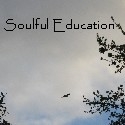
Last week the kids and I celebrated Rosh Hashana*, the Jewish New Year. We're not Jewish, but it correlated with the school story I'm telling, so I went with it. Originally I was thinking it would be a nice way to include/introduce spiritual customs and rituals that we're not familiar with. You know the drill-- increase cultural literacy: eat the food, speak the language, tell a story. But it turned out to be a much deeper experience than that.
In our school story, our main character Clara had just arrived at her grandmother's house. Upon rising her first morning there, she spied some children from her window. They were hurrying along (to synagogue,) but upon seeing her they called out, "L'shanah tovah"-- wishing her a good year. Of course she wanted to go play with them, but her grandmother told her the kids would be in synagogue most of the day... which left it wide open for a discussion of Rosh Hashana itself, including the 100 notes sounded from the ram's horn, or shofar, during synagogue.
Now, you're a homeschooler and you could potentially use this as a maths lesson-- 100 notes sounded off from a horn, or flute, or what have you. Would that be some sort of blasphemy? I wondered about that. Could one potentially blast those notes and still preserve some sort of religious/cultural respect? We tried, but frankly there's something mildy amusing that happens when you get beyond thirty or forty and then begin to lose count. The point of the notes, it is believed, is that they issue a call to repentance. And depending on how you look at it, laughter itself is a very cleansing activity. On the other, I suppose it gives us something to repent about.
Terrible, I know. But I love the idea of a holiday of repentance. Everyone gets a chance at a clean slate. If you suck, you make amends. And you get ten days to do it. There's a very clear parameter there which is very appealing. I mean, who among us doesn't need to make amends for something?
So we ate of the food, we said the greeting, we pretended the shofar, and then we took a walk at a nearby creek. I handed them each some bread crumbs and told them how in our school story Clara went for a walk with her grandmother on Rosh Hashana. And her grandmother, though not Jewish either, said that sometimes there is a great wisdom in other people's customs. And then she began the practice of casting off her sins, or misdeeds, into the flowing water of the creek. This practice is known as Tashlikh, and the quality of this experience just sent a great hush over us as we walked along and did our own casting off.
I don't know what my kids were thinking about when they were emptying their pockets, surely they don't have many misdeeds at their ages... but me at my age? Goodness. It's good to think about these things-- a mandatory introspection. I really did stop and assess my behavior and attitudes and how it compares to the person I want to be. The parent I want to be. Am I doing my best? Am I living up to my full potential? Why am I falling short of that? What can I do differently?
Yeah, I know. All that in a piece of bread.
There's something about the sound and energy of rushing water that I've always found to be very cleansing. As soon as I read about the practice of Tashlikh, I thought, "those Jewish people are smart!" I mean it! Remember the last time you walked on the beach-- the sound of the water rushing in and receding. It does something to a person. There's some energetic shift, a lightening, that you can't help but feel. I remember as a little girl going up in the Chiricahua mountains and standing near a rushing stream and feeling like I was witnessing some kind of magic happening. I felt so light and free and connected.
It happened again when my dad died three years ago and I was experiencing such a state of complete loss and anguish. His loss was deeply crushing, and the excruciating emotional months that followed his death-- the funeral, the family gatherings, the wading through the material pieces of his life-- completely overwhelmed me. I remember wondering how I would ever overcome these feelings. And then another family member died, and the emotional charge was just unfathomable.
We packed the kids in the car and we drove to the beach, and it was the best thing we could have done. I walked along the water's edge and felt the ache in my heart begin to ease. So we spent a lot of time near flowing water for the next few months... hiking along creeks, canoeing in the river-- they all had that same effect. I don't know if it's a tonal healing, the sound of the water, or if it's something far more encompassing than that. All I know is that I've felt it work.
The practice of "letting go" is known and practiced by many different religions. You've heard people say, "Let go, and let God." Even with Zen and Buddhism, there is this idea that you shouldn't be attached to things, you should let them go. So you meditate to clear your mind, to achieve "nothingness"-- emptying out all that internal chatter, the desires and regrets and what have you, which is the way to enlightment. Enlighten. To make lighter. To ease. To rise.
As the kids and I walked alongside the creek on Rosh Hashana, there was a definite lightening of our pockets as we tossed our bread crumbs into the water. Though it was a truly meaningful experience for me, I wasn't sure if the kids really got the point of it. It's such an inner experience, this holiday of repentance, despite the tangibility of the activity of Taklish-- releasing the the bread into the water. As it turned out, my children surprised me. They were fairly quiet and focused, even after they ran out of bread. They, too, were reluctant to return home again.
Moonshine, my five-year-old, turned to me and with great earnest asked if we could do this again. "Do what, toss bread into the water?" I asked her.
"No," she said. "Celebrate Rosh Hashana. Every year."
Sometimes there is a great wisdom in other people's customs.
*Everything I learned about Rosh Hashana and the Days of Awe I got from Judaism 101-- here and here.







that's beautifully written up.
ReplyDeletein Islam we have many 'washings away' every day - in the ablution before prayer most notably, but many more, and the prayer itself is compared to having a stream in which we wash five times a day.
you know you have to try a fast now since it's Ramadan ,)
i'm trying out another blog. let me know what you think please if you have time...
woops, here's address:
ReplyDeleterainbowsandshukr.wordpress.com
i think that will link it anyway.
This is lovely, Sara.
ReplyDeleteMy kids would just eat the bread. And throw rocks in the creek. And fall in the creek. And fight.